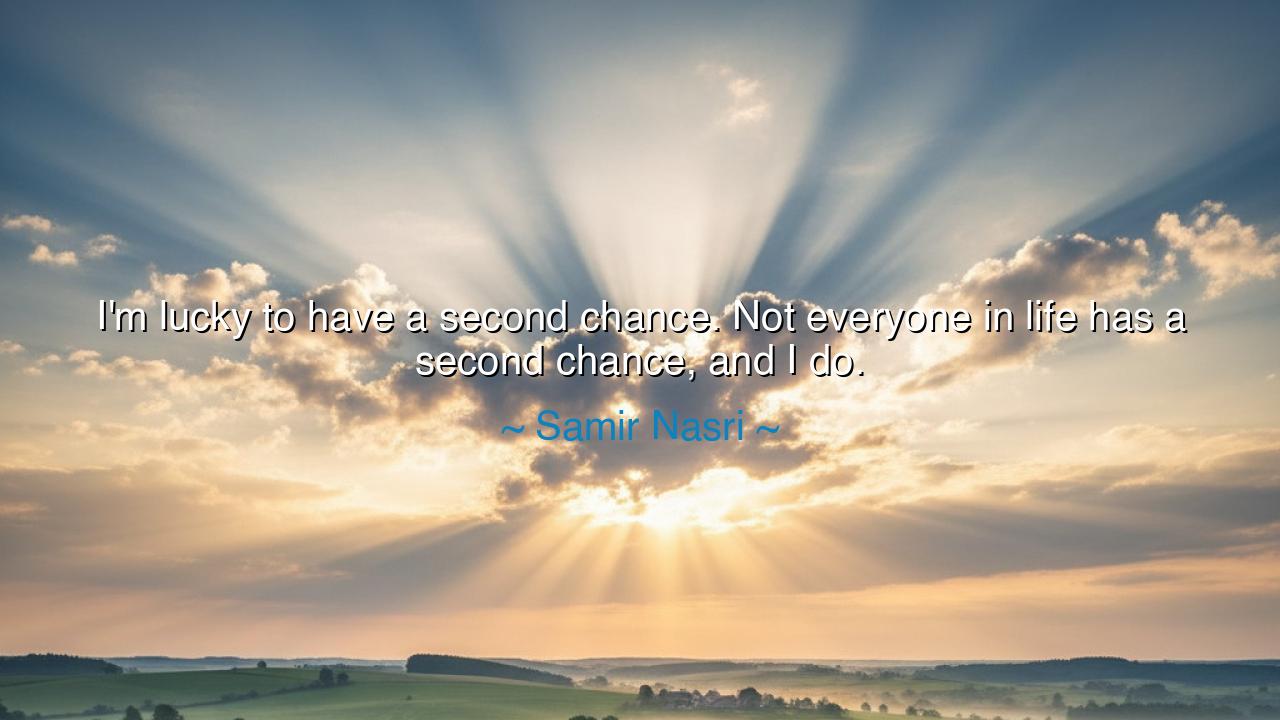
I'm lucky to have a second chance. Not everyone in life has a






In the grand journey of life, there are moments when fate offers us an unexpected second chance, a moment to redeem ourselves, to rise from the ashes of past mistakes, and to forge a new path forward. Samir Nasri’s words, “I'm lucky to have a second chance. Not everyone in life has a second chance, and I do,” resonate deeply with the human condition, for they speak to a universal truth: second chances are rare gifts, and their value is immeasurable. To be given such a chance is not merely about opportunity, but about the wisdom and grace to recognize and seize it. In these words, Nasri reflects not just on his personal journey, but on a timeless principle: that the greatest power lies in the ability to start anew when life offers us the opportunity to do so.
The ancients were keenly aware of the fleeting nature of life’s opportunities. In the stories of the Greek heroes, there is often a recurring theme of second chances, where a warrior or leader is given the opportunity to atone for a failure, a loss, or a defeat. Take Odysseus, for example, whose long and arduous journey home was filled with setbacks and misfortunes. Yet, through patience, wisdom, and perseverance, he earned the chance to return home and reclaim his rightful place. His story is one of redemption, of seizing a second chance granted to him not by fortune alone, but by his own resolve and determination. In this, we see that the second chance is not just about receiving another opportunity, but about using that chance wisely to rebuild and transform oneself.
Similarly, the life of King David of Israel offers an ancient example of redemption through a second chance. David, a man described as “a man after God’s own heart,” made profound mistakes, including his infamous affair with Bathsheba and the arranged death of her husband, Uriah. Yet, David did not let his past define him. After facing the consequences of his actions, he was given a chance to redeem himself. In the Psalms, David expresses the pain of his failures but also the hope that his mistakes could be overcome through humility and repentance. His life teaches us that second chances are not merely about escaping judgment, but about embracing the opportunity to learn, grow, and become better than we were before.
In more modern times, we see that the second chance is often not freely given but must be earned through perseverance, resilience, and a willingness to change. Nelson Mandela, who spent 27 years in prison, is one of the greatest examples of redemption through second chances. Mandela’s life was filled with moments of profound suffering, but he chose not to be defined by his years of imprisonment or the struggles of his past. When he was released, he faced the daunting task of leading a deeply divided South Africa, but he seized the second chance to heal a nation. His story is a powerful reminder that second chances are not just about personal transformation but about using those moments to serve the greater good.
However, as Nasri’s quote reminds us, second chances are rare. Not everyone receives the opportunity to try again, and for those who do, it is essential to recognize the weight of this gift. In the ancient world, the gods were often seen as the arbiters of fate, granting mortals opportunities to redeem themselves only in exceptional circumstances. Heracles, the great Greek hero, was granted a second chance to redeem his failures through his Twelve Labors. These labors were not easy, but they were a path through which Heracles could prove himself worthy of forgiveness and restoration. In his willingness to accept the challenge, Heracles demonstrated the true nature of redemption: it is not just about receiving a second chance, but about using it to transform and grow.
For us, the lesson is clear: when life offers a second chance, we must embrace it with humility and gratitude, recognizing that such opportunities are rare and that they are meant to be seized with purpose. The ancients teach us that second chances are not merely moments of escape from past mistakes, but pathways to personal growth and greater wisdom. Whether in our personal lives, careers, or relationships, we must remember that redemption comes not from denying our past but from learning from it and using the lessons we’ve gained to become better and more capable in the future.
Thus, let us honor the second chances we are given. Let us not squander these moments, but instead, let them fuel our journey towards growth, redemption, and service to others. Just as Nelson Mandela and Heracles transformed their lives through their second chances, so too can we. The key is not to dwell on past failures or to lament missed opportunities, but to look forward with hope, knowing that every day offers us a chance to reinvent ourselves, to make things right, and to serve a higher purpose. In doing so, we honor not only our own potential but the precious gift of a second chance.






AAdministratorAdministrator
Welcome, honored guests. Please leave a comment, we will respond soon